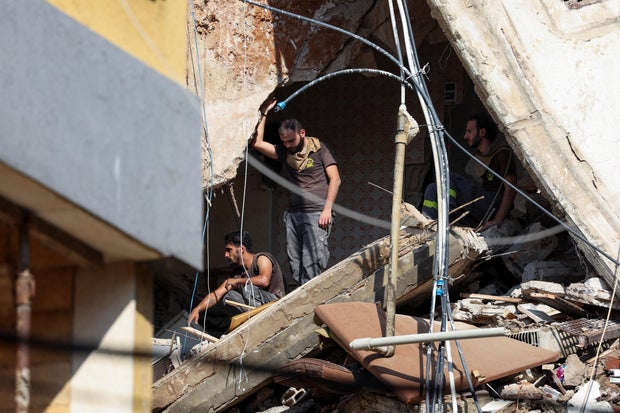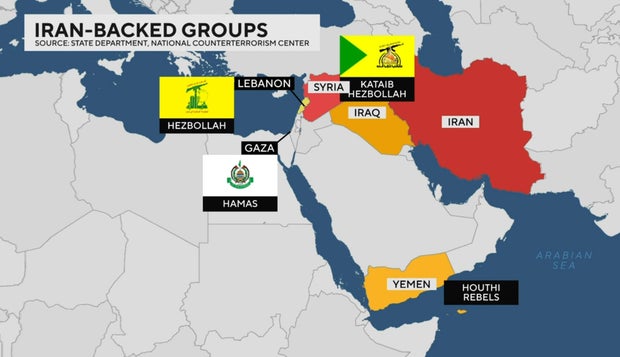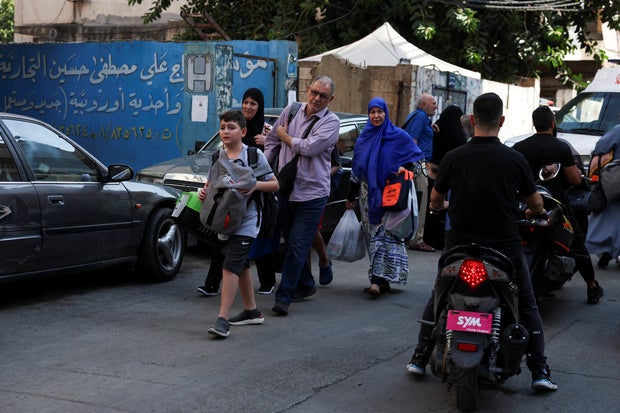Beirut, Lebanon — Israel announced dozens of new air strikes on Hezbollah strongholds in Lebanon Tuesday, a day after Lebanese officials say 558 people, including 50 children, were killed in the deadliest bombardment since a devastating war in 2006. Israel’s latest strikes on southern Lebanon came after it said it had killed a “large number” of militants as it struck about 1,500 suspected Hezbollah targets around the country.
Hezbollah said Tuesday it had launched volleys of missiles at Israeli military bases, hours after 180 of its projectiles and an unmanned aerial vehicle crossed into Israeli airspace, sending people in the city of Haifa running for shelter. The Israeli military said more than 50 projectiles were fired into northern Israel in less than 10 minutes on Tuesday morning, most of which were intercepted.
In Lebanon, one missile slammed into southern Beirut later Tuesday morning, targeting, according to Israeli media, the head of Hezbollah’s missile program, Ibrahim Muhammad Qabisi.
Gruesome images of a man’s mutilated, charred body on top of a relatively unscathed SUV spread quickly on social media after the strike was reported in the Ghobeiry suburb of Lebanon’s capital, with claims that three floors of a nearby building had been destroyed by a strike delivered by an Israeli fighter jet.
Mohamed Azakir/REUTERS
Lebanon’s public health ministry said six people were killed in the attack, but it did not identify them. Israel’s military did not immediately confirm who was targeted in the strike, or whether the intended target was hit.
Monday’s raids killed 558 people, including 50 children and 94 women, according to Health Minister Firass Abiad, who said “the vast majority, if not all of those killed in yesterday’s attacks, were unarmed people in their homes.”
The Israel Defense Forces said it sent thousands of text, audio and video warnings to Lebanese civilians to evacuate from areas being targeted, and Prime Minister Benjamin Netanyahu, addressing Lebanese civilians, accused Hezbollah of positioning its “rockets in your in your living rooms and missiles in your garage.”
“Those rockets and missiles are aimed directly at our cities, directly at our citizens,” he said, as the Israeli military posted videos online showing secondary explosions after its airstrikes — proof, it said, that Israel was destroying hidden weapons.
On Tuesday, Hezbollah issued a warning to Lebanese civilians via its media center not to scan a QR code on leaflets dropped by Israeli aircraft in southern Lebanon. The leaflets urge residents to scan the code for information on which buildings are set to be targeted, but Hezbollah claimed they were an attempt by Israel to spy.
“Do not open or circulate the barcode. You must immediately destroy the leaflet because it is very dangerous and can retrieve information from your phone,” the group claimed, without offering any evidence.
What are Hezbollah and Israel fighting for?
Hezbollah, one of the largest and most powerful of the so-called Iranian proxy groups that the Islamic republic supports across the Middle East, has been locked in near-daily cross-border exchanges of fire with Israel for nearly a year, since its Hamas allies staged the unprecedented terrorist attack on Israel on Oct 7.
Hezbollah, which has been fighting Israel for decades, and other Iran-backed groups in the region have joined the fighting. The Houthi rebels in Yemen, for instance have launched dozens of missiles at commercial and military vessels in the vital shipping lanes of the Red Sea, claiming, like Hezbollah, to be acting in support of the Palestinians in the war-torn Gaza Strip.
CBS News
Monday’s bombardment of Lebanon was by far the largest and deadliest, not just in the past year, but since the Israel-Hezbollah war in the summer of 2006.
That war killed 1,200 people in Lebanon, mostly civilians, and 160 Israelis, most of them soldiers, and devastated large swathes of Hezbollah’s strongholds.
Mass exodus in Lebanon, flights cancelled
The United Nations said tens of thousands of Lebanese had fled their homes since Monday, in the face of the intensifying Israeli bombardment.
“Tens of thousands of people were forced from their homes yesterday and overnight, and the numbers continue to grow,” U.N. refugee agency spokesman Matthew Saltmarsh said, adding that “the toll on civilians is unacceptable.”
Mohamed Azakir/REUTERS
Cars choked Lebanon’s highways as people fled into the night, trying to escape north toward the capital Beirut.
“It was a day of terror,” 41-year-old housewife Thuraya Harb told AFP at a makeshift center for displaced families in Beirut after fleeing her home in south Lebanon.
“I didn’t want to leave my home, but the children were scared,” the mother of four said, adding that the family fled “with nothing but the clothes on our backs.”
While most of those fleeing from their homes were just trying to reach safer areas in Lebanon, a Syrian security official told the AFP that about 500 people had crossed the border into the country, where violence has lingered since a civil war erupted in 2011, on Monday alone.
Getting out of Lebanon is likely to get increasingly difficult, with a number of airlines already halting flights to and from the country already over concern that the security situation will deteriorate.
Rafiq al-Hariri Airport in Beirut said more than 30 flights were cancelled on Tuesday, with Qatar Airways, Air France, Lufthansa and Delta Air Lines all putting travel to and from the Lebanese capital on hold. Some airlines have also started cancelling flights to Israel, fearing a major escalation.
U.N. and EU voice concern: “Almost in a full-fledged war”
Israel has dubbed its raids on Hezbollah “Operation Northern Arrows” after announcing earlier this month it was shifting the focus of its firepower from Gaza to Lebanon.
Hezbollah backer Iran, which arms, trains and funds the U.S.-designated terrorist group, condemned the raids, with its president, Masoud Pezeshkian, saying Tuesday that its ally “cannot stand alone” against Israel.
“Hezbollah cannot stand alone against a country that is being defended and supported and supplied by Western countries, by European countries and the United States,” Pezeshkian said in an interview with CNN. “We must not allow Lebanon to become another Gaza at the hands of Israel.”
Other leaders have expressed alarm over the rapid escalation, with U.N. Secretary-General Antonio Guterres’s spokesman saying he was “gravely alarmed” and the EU’s top diplomat Josep Borrell warning “we are almost in a full-fledged war.”
The Pentagon said it was sending a small number of additional U.S. military personnel to the Middle East after thousands were deployed earlier alongside warships, fighter jets and air defense systems.
A US official, speaking on condition of anonymity, said that Washington opposed an Israeli ground invasion targeting Hezbollah and had “concrete ideas” on how to de-escalate the crisis.
China’s top diplomat Wang Yi expressed support for Lebanon and condemned what he described as “indiscriminate attacks against civilians.”
“An extremely dangerous situation” as Gaza war continues
Israeli armed forces chief Herzi Halevi said Monday’s strikes hit combat infrastructure Hezbollah had been building for two decades, while Defense Minister Yoav Gallant called Monday “a significant peak” in the operation.
“This is the most difficult week for Hezbollah since its establishment — the results speak for themselves,” he said.
Netanyahu said Israel was acting to change the “security balance” in the north, while Hezbollah said it was in a “new phase” of confrontation with Israel.
War in Gaza began with Hamas’ Oct. 7 attack on Israel, which saw terrorists kill some 1,200 people, mostly civilians, according to Israeli officials. Of the 251 hostages seized by militants, 97 are still held in Gaza, including 33 the Israeli military says are dead.
Israel’s retaliatory military offensive has killed at least 41,467 people in Gaza, most of them civilians, according to figures provided by the Hamas-run territory’s health ministry. The U.N. has described the figures as reliable.
Since the start of the Gaza war, clashes along the Lebanon-Israel border have forced tens of thousands of people on both sides to flee their homes.
The violence between Israel and Hezbollah escalated dramatically last week, when coordinated communications device blasts that the militants blamed on Israel killed 39 people and wounded almost 3,000.
Then on Friday, an Israeli strike on southern Beirut, a bastion of Hezbollah, killed its elite Radwan Force commander, Ibrahim Aqil.
An Israeli military official, who cannot be identified, said the military is seeking to “degrade threats” from Hezbollah, push them back from the border and destroy infrastructure.
“This is an extremely dangerous situation, but one that for me still leaves room for diplomacy to avoid the worst,” said Israeli political analyst Michael Horowitz.
,
Chris Livesay and
contributed to this report.


